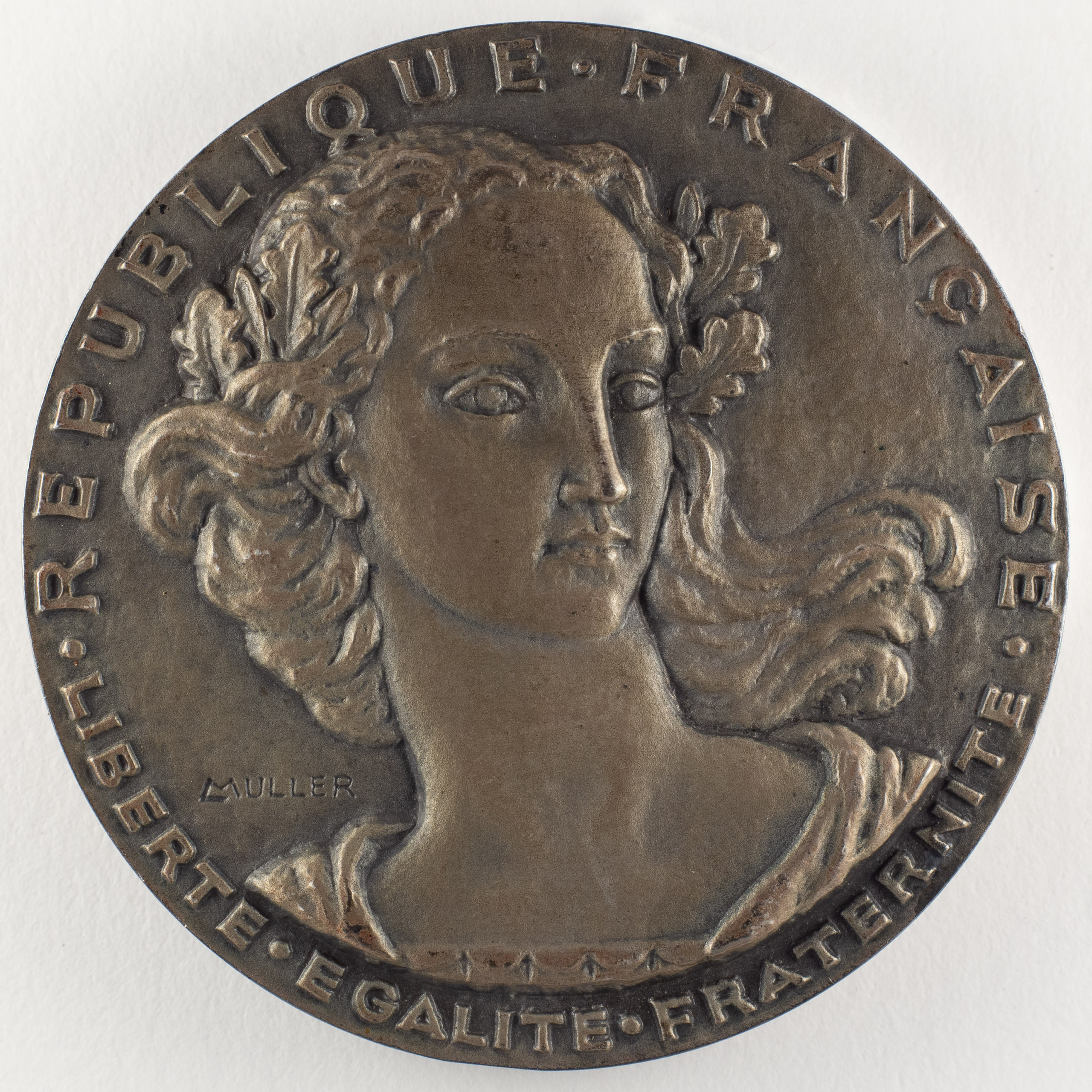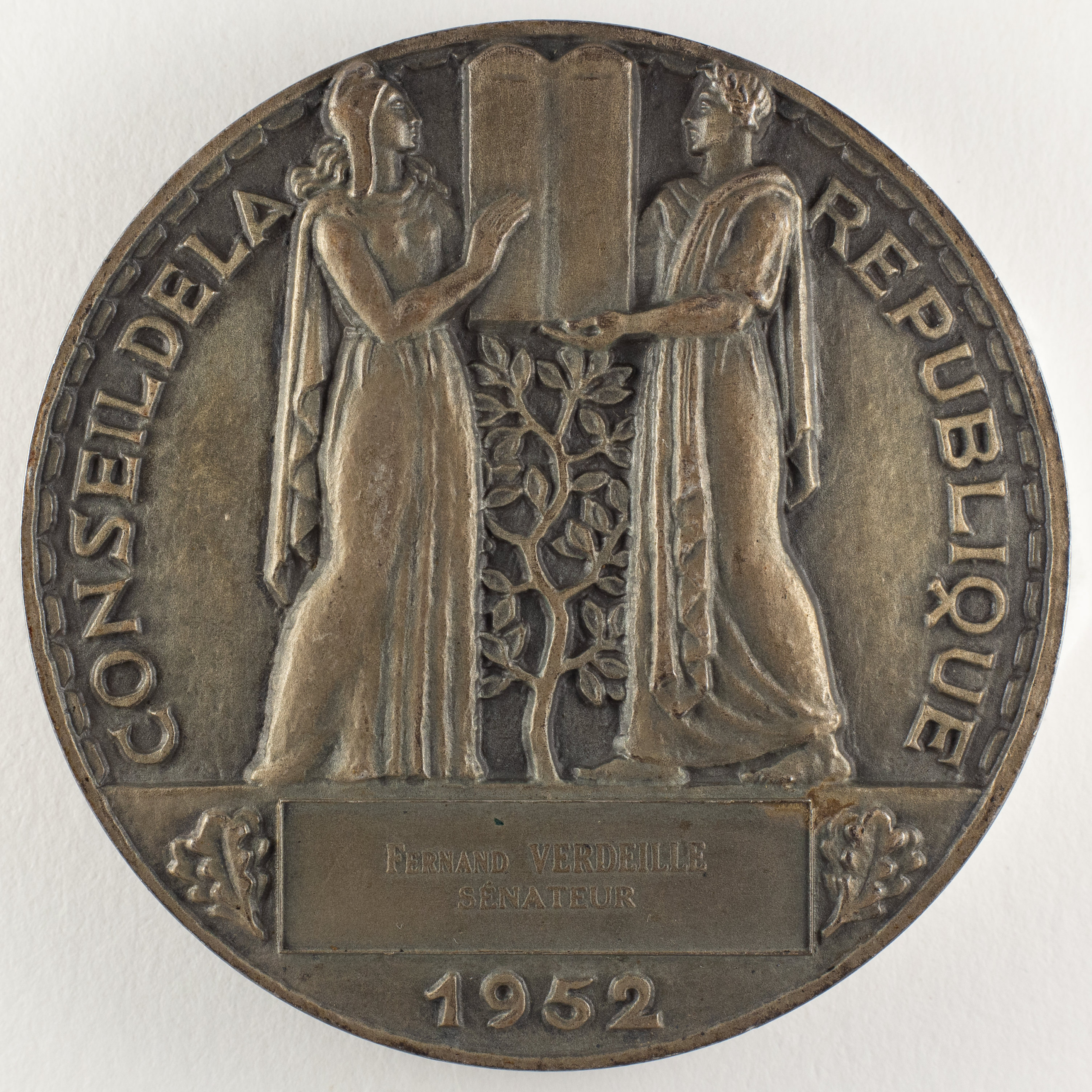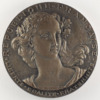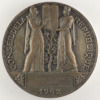Identity medal of the Council of the Republic – François Verdeille – Senator of Tarn – Signed by Louis Muller
-10% sur votre première commande avec le code BIENVENUE10
In 1st grade 950 ‰ silver
Weight: 65.6 g
Diameter: 50 mm
Obverse:
Circular inscription: REPUBLIQUE • FRANCAISE • LIBERTE • EGALITE • FRATERNITE
Bust of the Republic , crowned with oak .
Signature: L MULLER
Reverse:
Circular inscription: CONSEIL DE LA REPUBLIQUE
The Republic , wearing a Phrygian cap , and a Genius draped and crowned with laurel, hold the tablets of the law . In the center, between these characters, we see an olive tree .
Cartouche accompanied by two oak branches bearing the attribution:
FERNAND VERDEILLE (see biography at the bottom of this description)
SÉNATEUR
In the epigraph: 1952
Edge:
Cornucopia hallmark (Paris Mint) + 1 ARGENT
Biography of Fernand Verdeille (Source: Senate website) :
Born September 26, 1906 in Penne (Tarn)
Died on October 20, 1974 in Paris (*)
Councilor of the Republic then senator of Tarn from 1946 to 1958
Born on September 26, 1906 in Penne in the Tarn, to a father who was a craftsman and socialist activist, Fernand Verdeille attended the Beaumont-de-Lomagne municipal school in Tarn-et-Garonne and then completed a solid secondary education, which he completed at the Montauban teacher training college, where he was active in the Jeunesses socialistes from the age of sixteen. Holder of the higher certificate and the teaching aptitude certificate, he was appointed teacher in 1926 in Bruniquel. There, he chaired the local popular education society and quickly rose to the office of the departmental teachers’ union. A member of the SFIO recognized for his qualities and dynamism, he reconstituted the Tarn federation after the split of the neo-socialists in 1934. Transferred three years later to the Montauban higher primary school, he gave up teaching in 1938 to become the owner of the Librairie des écoles in Albi. He was then secretary of the Toulouse region booksellers’ union and chaired the Bas-Quercy prehistoric society and, notably playing rugby successfully, several sports societies.
During the Second World War, Fernand Verdeille served in the infantry and fought in Alsace. Demobilized as a reserve lieutenant in June 1940, he then participated, in liaison with the resistance organizations of his department, in the reorganization of the clandestine SFIO federation. At the Liberation, he received as a just reward the 1939-1945 war cross with palm.
Elected in the canton of Vaour in September 1945, Ferdand Verdeille, then a member of the board of the Albi Chamber of Commerce, was called to sit the following month as president of the Tarn general council, a mandate he would hold for ten years. He ran unsuccessfully for the second Constituent Assembly and the legislative elections of 10 November 1946, in second position on the list of the socialist party SFIO, led by Joseph Deixonne. A month later, as a candidate in the elections to the Council of the Republic on 8 December 1946, he obtained 181 votes out of 701 votes cast against 285 for the MRP Marcel Grimal and won the seat to be filled under the interdepartmental representation. Another satisfaction, Fernand Verdeille won the town hall of Penne in October 1947, which he would not abandon until 1965 to join that of Vaour.
Upon his arrival at the Upper House, he joined the socialist group and sat on the Overseas France and Interior committees. In 1947, he was also appointed to the National Council of Public, Departmental and Municipal Services. He tabled five texts on the desk of the Council of the Republic concerning local finances and the compensation of general councillors of overseas territories. His few interventions in public session concerned the validation of the election of Jane Vialle in Oubangui-Chari, the reconstruction and equipment budget and the cost of hunting permits.
In the elections of November 7, 1948, for the total renewal of the Council of the Republic, Fernand Verdeille once again led the list of the socialist party SFIO and won the first of the two seats to be filled, with 547 votes out of 823 votes cast.
He returned to the two committees of which he had been a member since 1946 and decided to intensify his parliamentary activity. As vice-president of the interior committee, he submitted seven reports between 1948 and 1952 on the postponement of cantonal elections in the overseas departments, the increase in pensions for volunteer municipal firefighters and the forest fires in the Landes region of Gascony. He was also the author of four bills or resolutions concerning aid for victims of a tornado in his department, the increase in the resources of the autonomous sinking fund and line fishing.
He supports most of these texts in public session but he also intervenes in the discussions on relief for the city of Cherbourg, aid for victims of atmospheric disasters, the distribution of local taxes as well as those on petroleum products. Finally, he asks an oral question to the Minister of Public Health and Population on the conditions for granting the temporary allowance to the elderly.
On May 18, 1952, in the elections to the Council of the Republic, Fernand Verdeille was easily re-elected to his mandate as senator for Tarn with 429 votes out of 825 votes cast. Once again vice-president of the interior commission, he also sat on the media committees in 1952, overseas France in 1953, the press from 1953 to 1956, beverages in 1954 and agriculture from 1956 to 1958. Finally, he was part of the steering committee of the association of mayors of France from 1955.
On behalf of the Interior Committee, he submitted five reports concerning the increase in pensions allocated to volunteer municipal firefighters, the special powers of the government in Algeria, the guarantee of revenues in terms of local taxes and aid to victims of national disasters between 1955 and 1958. He also drafted two bills and resolutions calling on the government to authorise the hunting of theft and to re-establish the financing of the special road investment fund by taxes collected on the consumption of certain petroleum products. Finally, he asked two oral questions to request that the State take charge of the back pay of civil servants and municipal agents who had suffered damage during their career, the exemption of military periods for former prisoners of war and the definition of the criteria for distributing the road investment fund across the territory.
But the summary of Fernand Verdeille’s parliamentary activity during this third term would be incomplete if it did not mention his numerous interventions mainly concerning the codification of hunting law and the protection of nature (he is also president of the inter-parliamentary group and member of the Higher Council for Hunting) but also overseas issues and the problem of Algeria.
In June 1958, after voting for the renewal of special powers in Algeria, full powers for the government and constitutional revision, he was re-elected to the last Council of the Republic at the head of the socialist list.
This former schoolteacher who became a bookseller in Albi just before the war, a local figure of the SFIO who had been in the Resistance, entered politics at the Liberation by becoming president of the Tarn General Council in 1945, then by being elected the following year as mayor of his hometown of Penne and socialist senator of the same department (at less than 40 years old thanks to an exemption). Constantly re-elected to the Council of the Republic until the end of the Fourth Republic, Fernand Verdeille continued to sit in the Palais du Luxembourg within the socialist group after the change of regime by being re-elected in his mandate from the first round, on April 26, 1959 (he was re-elected in 1968). He maintained solid local bases, as mayor of Penne-du-Tarn until 1965 then of Vaour until his death, and as general councilor of Tarn (elected in the first round in 1958, 1964 and 1970). A member of the steering committee of the Association of Mayors of France since 1955, Fernand Verdeille has maintained this commitment under the Fifth Republic.
Fernand Verdeille became the defender of the communes in the Senate, seeing them as the basic framework of democracy. He mercilessly opposed all initiatives that he believed undermined their proper functioning. He thus fiercely fought the law on the grouping and mergers of communes and measures leading to the transfer of charges to the detriment of the communes. Passionate about nature, he worked from the beginning of the 1960s for the protection of the environment even before this theme became fashionable. Eager to preserve the purity and dynamism of rural areas, he denounced the common peril of pollution and rural exodus. At his funeral, the Minister for Quality of Life, André Jarrot, paid tribute to his commitment in this area. Appointed vice-president in October 1959 of the Committee on Constitutional Laws, Legislation, Universal Suffrage, Regulations and General Administration, former member of the Committees on Overseas France and the Interior under the Fourth Republic, Fernand Verdeille is perfectly familiar with the workings of legislative work. He uses this experience to intervene effectively in his preferred areas. We see him argue competently during budget debates and discussions of bills concerning the grouping of rural municipalities, local finances, the water regime and their protection against pollution, the orientation of trade and crafts, the creation of national parks, and fishing usage rights.
But Fernand Verdeille is best known in the chamber and to the general public as a specialist in hunting issues. A great lover of hunting, which he practices in the forests of his native Grésigne on the borders of the Tarn and Tarn-et-Garonne departments, he becomes president of the parliamentary group for hunting, fishing and nature protection, while attending the High Council and the International Hunting Council (as well as the board of directors of the estates of the Château de Chambord). He gives his name to a law that creates approved communal or intercommunal hunting associations and that he sees as the codification of the right to hunt given to the people by the Revolution and of the protection of nature. This law of 10 July 1964 governs the right to hunt in 9,200 communes. Wherever these communal hunting associations (ACCA) were created, the law required owners of land of less than 20 hectares (or 40, or even 60 depending on the department) in a single block to open their properties to hunters. In the event of opposition, any owner (also automatically a member of the ACCA) must ensure by their own means the “guarding” of their land, its signage and the destruction of pests. The list of municipalities and departments governed by this law was drawn up by the Minister of the Environment after a request from the general councils and municipalities. For two years, from 1963 to 1964, in committee and public session, during numerous hearings, the senator worked to complete and enrich the text before bringing it to fruition. Once the law was passed, it took several more years of work, visits and discussions in the offices of central administrations for the implementing decrees to be issued. It is true that the text is delicate and quickly finds many detractors among private owners and animal rights activists. A surprising paradox, the Verdeille law (which its inspiration never ceases to defend in the columns of Le Chasseur français) was never applied in the Tarn, due to a lack of agreement between hunting associations and agricultural organizations.
In the Senate, Fernand Verdeille approved the law of 4 February 1960 authorising the Government to take, by application of Article 38 of the Constitution, certain measures relating to the maintenance of order, the safeguarding of the State, the pacification and the administration of Algeria. He voted in favour of the law of 13 July 1965 on the reform of matrimonial regimes and the so-called Neuwirth law of 28 December 1967 on the regulation of births. He opposed the law of 5 July 1972 on the creation and organisation of the Regions and abstained from voting on the so-called Royer law of 27 December 1973 on the orientation of trade and crafts. He was in favour of the law of 5 July 1974 setting the age of majority at 18.
Fernand Verdeille died on October 19, 1974, during his senatorial term. The vice-president, André Méric, delivered his eulogy, praising the man who, for 28 years, sat continuously in the Senate, “bringing with his stony accent the good sense, experience and solidity of men deeply rooted in the land of our provinces.”
| Graveur | |
|---|---|
| Fabricant | |
| Matière | |
| Size (in mm) | |
| Weight (in g) | |
| Theme | |
| Époque |
SKU: 20230913004
Category: Medals

















